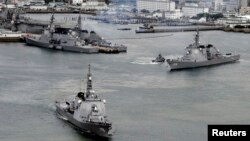Japan may miss a year-end deadline to review its military alliance with the United States as domestic political wrangling delays discussions, a leading newspaper said on Friday, although Japan's defense chief said it was working to complete the process on time.
Washington and Tokyo, staunch allies in Asia-Pacific, are working on the first review of their mutual security treaty in 17 years, aiming to update guidelines by the end of the year to reflect developments in areas such as satellite defense and cybersecurity.
The Asahi newspaper reported that political disagreement over military policy within Prime Minister Shinzo Abe's coalition was delaying discussions and that Japan and the United States were considering delaying the final guideline report.
“The deadline is something that we agreed on, so we will make diligent efforts to stick to that time frame,” Defense Minister Akinori Eto told a regular news conference in response to the report.
Bear the burden
The United States wants Japan to bear more of the burden for its defense, especially as China ramps up its military, while Abe is seeking a more robust military.
Abe took a historic step away from Japan's pacifism in July, when his government reinterpreted the postwar constitution to end a ban on Japanese troops fighting abroad.
But the decision, which allows Japan to come to the defense of friendly nations under attack, has caused problems for Abe's junior coalition partner, Komeito.
The party, backed by a lay Buddhist organization, wants to limit any “collective self-defense” deployment to waters around Japan, while Abe's Liberal Democratic Party wants to extend that right to helping defend its U.S. ally to places such as the Middle East and the Gulf, the Asahi said.
In an interim update to the guidelines a month ago, Japan and the United States agreed to map out how they will work together under collective self-defense. But Abe's government will not submit enabling legislation to parliament until at least early 2015.
Despite the constitution's ban on “land, sea and air forces, as well as other war potential," Japanese governments have interpreted the charter to allow what is now a defense budget on par with Germany's and one of the world's largest navies.





